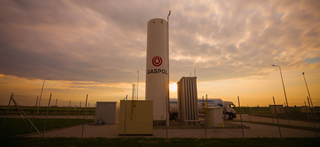What is LNG and what benefits does it offer?
LNG is natural gas that has been converted to a liquid form by cooling it to approximately -162°C, creating a clear, colourless, and non-toxic liquid. In this liquid state, LNG takes up 1/600th of the space of natural gas making it much easier to ship and store when pipeline transport is not feasible. It is cheaper to produce than other fossil fuels and can be transported economically from the production source and converted back to a gaseous form at its destination.
Its role in energy transition to more environmentally friendly fuels is important as it releases significantly less CO2, NOx and SOx and virtually no ash or particulates. And as it evaporates rapidly when exposed to the air, it leaves no residue on water or soil.
GASPOL see the potential for LNG supply to customers and build a new regasification station
GASPOL have recognised the benefits of LNG and they are offering it as an efficient and cleaner alternative to customers who are looking for energy supply to heat and support large warehouses, large factories or other manufacturing buildings.
An example of how LNG can play a significant role in this transition, is highlighted when the GASPOL team completed the construction of an additional LNG gasification station in July 2021 in the city of Kalisz, in central Poland. The station was located to serve a customer location where no natural gas was available and was to be used to heat a large production hall and as source of energy for the technology and processes.
The LNG story on video
The team took the opportunity to film the implementation of the station with a series of videos showing the process of building an LNG station and using it as a practical example of the benefits it can bring.
It shows first-hand, the direct advantages of LNG installations, building in areas without access to the natural gas network and allowing on-site monitoring of gas consumption. The team also used the case study to draw attention to the environmental benefits of LNG, emitting 55% less CO2 compared to coal.
Assisting with transition and climate goals
The example now shown on video highlights the ability to offer such solutions and can be a positive contribution to updating the energy supply for buildings from coal and heating oil. The team at GASPOL are confident that promoting the use of LNG in this way will be a significant step forward for large infrastructure investment sites.
By increasing the use of LNG in the Polish market it will be a crucial factor in more environmentally friendly and efficient energy being available and move towards achieving the ambitious climate goals set by the European Union.



 }
}
 }
}
 }
}
 }
}